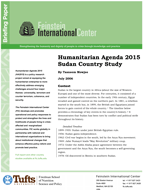Sudan has been torn by conflict and political strife throughout its history. As a result of the various conflicts, the political and economic situation in different parts of Sudan is very different. Discussions with a group of international NGOs (INGOs) in Khartoum highlighted the fact that there was tension between human rights and local traditions, so INGOs have to be pragmatic.
Sudan had a direct link with Al Qaeda because Osama bin Laden settled there in 1991 and remained until 1996, when he moved to Afghanistan. However, after 9/11, the government decided to cooperate fully with the United States on terrorism. It has been argued that this was because the Sudanese government wished to avoid being added to the US’s list of targets after Afghanistan and also because it was desperate to end US sanctions and attract American oil investors. The issue of taking a political stance has been much more acute for aid agencies in Darfur.
There was general agreement among non-Sudanese interviewees that aid workers are globally less secure than they used to be, though one INGO staff member felt that it was possible to over-romanticize the “good old days.” He argued that Iraq and Afghanistan are exceptional situations. According to an UNMIS official, conflicts during the Cold War were state-sponsored, so there were rules of engagement.







